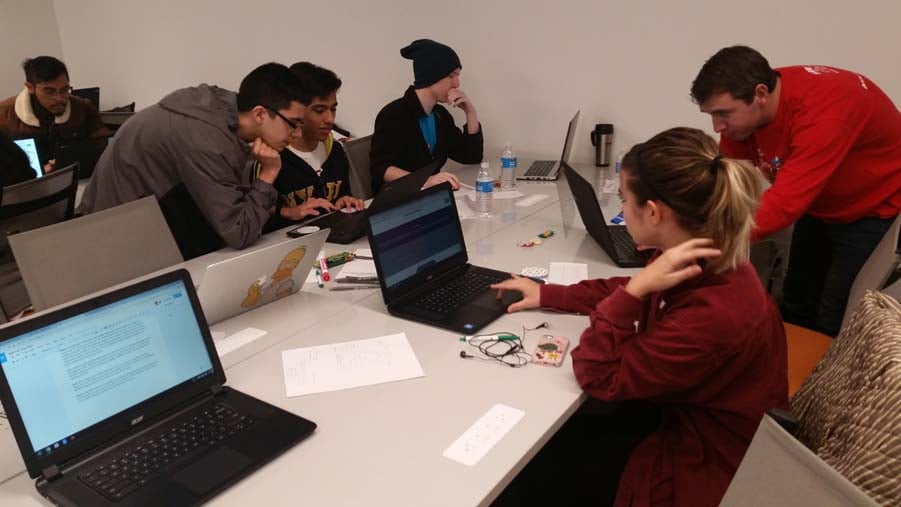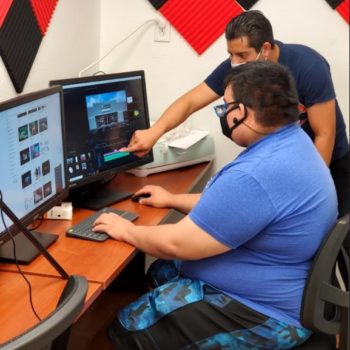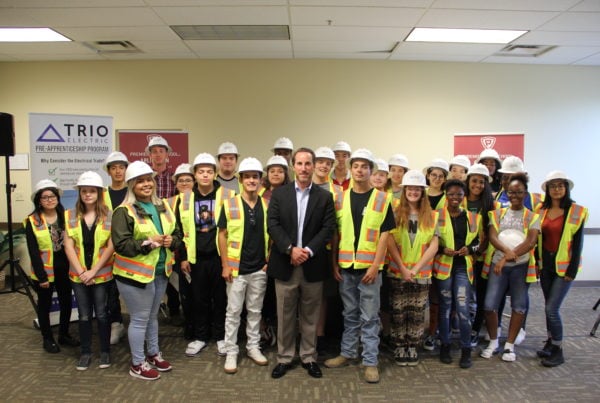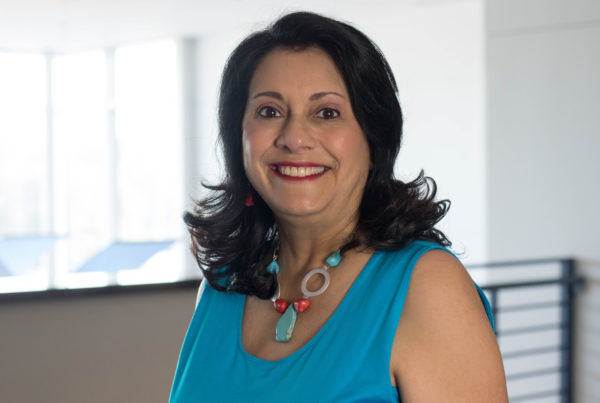Competitive computer programming sounded like a fun way to spend a Saturday to Premier High School of North Austin students Chloe Puckett, Jacob Carlson, Irvin Beltran and Joshua Villa. When they signed up to represent their school at Austin’s Coding4TX student hackathon in December, the students were looking for a chance to test their coding skills, ability to work as a team and creativity. Winning was not their objective. So it took them by surprise when their name was announced as best overall out of the other 14 teams.
“I was listening to the announcer and thought I heard our name but didn’t believe it. The other teams had some very nice looking websites,” said Joshua.
At the beginning of the morning, the students were told to think of an issue that people face today and find a way to solve it using technology. With the support of a mentor who works in computer programming, students had four hours to design a prototype they could present and defend.
The Premier team decided to tackle the issue of settling disputes between teenagers at school. Using Javascript, HTML and CSS, they designed a website and an app prototype they named D-LON.
“It was essentially like a chatroom. You logged in and could talk with teachers or with students. It was mostly to help students keep from bottling up feelings or starting fights at school. It was supposed to provide a safe space to talk. While it allowed you to be anonymous, it was meant specifically for schools. You could login just in your school and have a safe chat room space,” said Chloe.
They all agreed that the biggest lesson they learned from the day is teamwork and how to communicate as a team. With very little time to complete their work, each member of the team took on a special role. Chloe, a sophomore, who had participated in a Hackathon before, took charge of overall organization. Joshua, a junior, who was currently learning Javascript and HTML in class, took on the role of designing the website. Irvin, a junior, designed the prototype app. Jacob, a senior, presented their idea to the judges.
Craig Stein, who teaches computer programming classes at Premier, believes his students won because they actually had the beginnings of an app to present.
“You didn’t have to have a working version at the end of the day, but our students had an actual working app. You could login and start using it a bit. It wasn’t fully functional, but it had the basic idea. They did a really good job taking this open ended topic and making it specific. What really set their project apart was that it was unique and it didn’t copy something currently out there,” said Mr. Stein.
Each hackathon has provided the students with a new challenge. In their first hackathon, they were an hour from their presentation when the program crashed, and they had to reprogram it. Despite that setback, they managed to get third place. This time, their presentation was the challenge.
“There is a time limit on the speech, and that stressed us out. I had spent half an hour working something out, but at the last minute we scrapped it. I had to come up with something new on the spot. Next year we definitely need to practice the speech more,” said Jacob.
In addition to working more on their speech next time, they also will focus on first planning out their code before they start.
“I also recommended organizing your code. Put in comments so you know what each piece of code does. That way, if you have issues, you can fix it faster,” said Irvin.
All the students agree that taking the coding class and volunteering to be part of hackathon competitions has convinced them that coding is a useful tool to have even if they don’t pursue it as a career. Jacob doesn’t think he wants to be a programmer, but he said the teamwork and communications side was really helpful.
For Chloe, taking her first coding class completely changed her interests. At first, she thought she would drop the class, but when she started learning HTML she was hooked. This year she is taking coding classes at her local community college and is hoping to pursue a career in game design.
“It was one of those proud moments as a teacher. I didn’t really care if they won, but that they came on a Saturday and that they did a good job working together. They represented us well. Coding is especially great at this school because there are not as many opportunities for team activities and extracurriculars,” said Mr. Stein.
With the popularity of the computer programming class, the school is working to expand the program so that student can continue to learn new skills. Next year they hope to add an AP computer science principles class.




